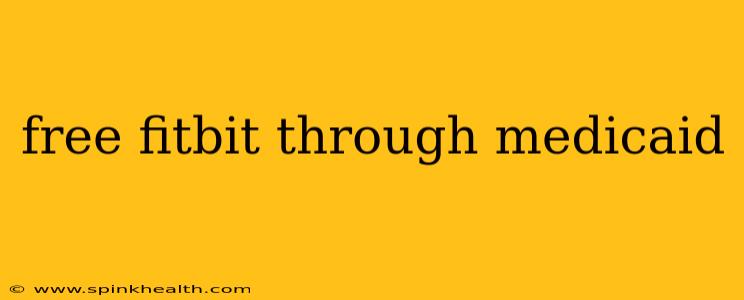Can I Get a Free Fitbit Through Medicaid? The Quest for Wellness
The allure of a Fitbit – that sleek, motivating wristband tracking your steps, sleep, and heart rate – is undeniable. It's a powerful tool for those on a health journey, offering a fun and engaging way to improve well-being. But what if you're on Medicaid? Can you get a free Fitbit through the program? The answer, unfortunately, isn't a simple yes or no. Let's unravel this question, exploring the complexities of Medicaid coverage and the possibilities for wellness support.
My journey into this topic started with a friend who was struggling to manage her diabetes. She mentioned wanting a Fitbit to help track her activity levels and better manage her blood sugar. This sparked my curiosity about the intersection of health technology and government assistance programs like Medicaid.
Does Medicaid Cover Fitness Trackers Like Fitbits?
This is the million-dollar question. The straightforward answer is: generally, no. Medicaid programs primarily focus on covering medically necessary services like doctor visits, prescription medications, and hospital stays. While promoting healthy habits is a key part of Medicaid's goals, a Fitbit, in itself, isn't considered a medically necessary item. Think of it this way: Medicaid covers the treatment for a disease, not necessarily every tool that might help you prevent it.
However, the situation isn't entirely hopeless. There are some potential avenues to explore:
Can Medicaid Cover Programs That Include Fitbits?
Some Medicaid programs may cover participation in specific health and wellness programs that might incorporate the use of fitness trackers. These programs are often designed to address chronic conditions like diabetes or heart disease. The key here is that the program itself, not the Fitbit, is what's covered. The Fitbit would be a tool within the program.
This is crucial. You wouldn't be getting a Fitbit directly from Medicaid, but your participation in an approved program might include receiving one as part of the intervention.
What Other Resources Might Help Me Afford a Fitbit?
If your Medicaid plan doesn't cover programs that use Fitbits, there are other options to consider:
- Charitable Organizations: Many local charities and non-profits focus on health and wellness. They sometimes offer financial assistance for health-related technology or might have partnerships with organizations that offer discounted Fitbits or other activity trackers.
- Community Health Centers: Community health centers often provide comprehensive healthcare services, including resources and support for healthy lifestyles. Inquire about their programs and potential partnerships.
- Employer Wellness Programs: If you're employed, check to see if your employer offers a wellness program. Many companies offer incentives or discounts on fitness trackers as part of their initiatives.
- Savings and Budgeting: Create a budget to see if saving up for a Fitbit is feasible. Even lower-cost trackers can provide valuable data and motivation.
Are There Cheaper Alternatives to a Fitbit?
While Fitbits offer a comprehensive range of features, several budget-friendly alternatives exist. Many smartphone apps offer basic fitness tracking capabilities, and several inexpensive activity trackers provide step counts and basic health data. Exploring these options could make achieving your fitness goals more accessible.
What About Other Health Technology?
The question of Medicaid coverage extends beyond Fitbits. The same general rules apply to other health technology like smartwatches and other wearable devices. While some aspects of their functionality might be indirectly related to managing certain conditions, they aren't typically covered directly by Medicaid.
In conclusion, while obtaining a free Fitbit directly through Medicaid is unlikely, exploring other avenues like wellness programs, charitable organizations, and budget-friendly alternatives might help you achieve your health goals. Remember, your path to wellness is a personal journey, and finding the right tools and resources is a crucial step along the way.

